Climate Wayfinding with Katharine Wilkinson
Air Date: Week of May 9, 2025
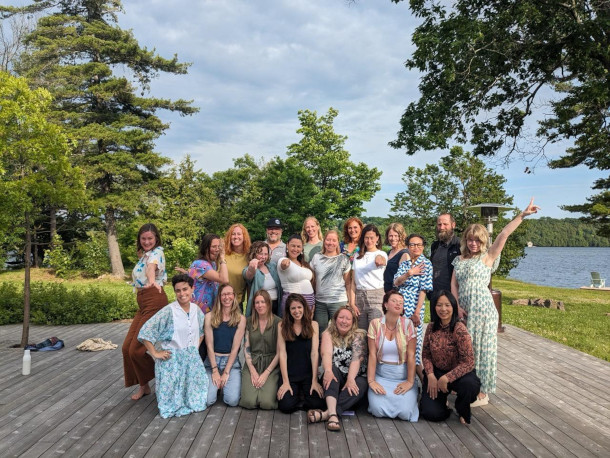
A climate wayfinding group gathers outside for a photo. As Wilkinson says, “It is no small thing to be human on Earth right now.” Climate Wayfinding seeks to provide a place to process that complexity, together. (Photo: Courtesy of Dr. Katharine Wilkinson)
A project called Climate Wayfinding aims to tend to the deepest needs of climate activists by providing a space for reflection, connection, and clarity amid the chaos. Climate Wayfinding has its roots in the All We Can Save project, co-founded by Dr. Katharine Wilkinson, who joins Host Jenni Doering to share her own story of moving from feeling lost to gaining clarity about her role in the climate movement.
Transcript
O’NEILL: It’s Living on Earth, I’m Aynsley O’Neill.
DOERING: And I’m Jenni Doering.
Climate change is rooted in the hard, cold data of global temperature rise, ice loss from melting glaciers, and parts per million of carbon dioxide. But navigating a world in crisis takes more than just facts or even smart policies. At the end of the day, it’s people who decide how we should live on this changing planet, and what if anything should be done in the face of the climate crisis. And a new project called Climate Wayfinding aims to tend to the deepest needs of climate activists by providing a space for reflection, connection, and clarity amid the chaos. And it’s especially meant for the next generation of climate leaders who may be feeling discouraged by the current political climate. The Climate Wayfinding initiative is spreading across college campuses and has its roots in the All We Can Save project, co-founded by Dr. Katharine Wilkinson, who joins us now. Katharine, welcome back to Living on Earth!
WILKINSON: Jenni, it's so nice to get to be back here with you.
DOERING: You founded the All We Can Save project. Remind us about All We Can Save and what that was trying to do.
WILKINSON: So, in the dark days of 2020, Ayana Elizabeth Johnson and I co-edited a collection of writings by women climate leaders, essays, poetry, as well as some wonderful art. And that time, if you looked around and you were like, who's holding the microphones on climate discourse? Who's shaping how we think about this problem, how we think about what the solutions are, what's possible? So often, women were not the ones doing that. They were often doing it in extraordinary and overrepresented ways, within grassroots organizations and within protests and organizing of various kinds, but often they weren't the ones holding the mic. And my thought was that's just, a) not going to work, and it's not particularly fair. So let's see if we can do something that helps to move the needle towards a more representative shaping of our collective climate conversation. And that's really what the anthology was about, the sort of trends that I was witnessing and Ayana was also seeing in the climate space of these sort of gender disparities, there has been progress made on that. So it's still not equitable. We still know that most of the climate funding, for example, does not go to efforts led by women. It goes to efforts led by men. And I'm speaking in sort of gender binary terms, knowing, of course, that the world is more complex than that, but women are still underrepresented, for example, in the UN climate negotiations. And this, I think, is quite different than it was at the time when I felt such an urgency around this anthology project, and when we were moving the book towards publication, it was really clear that kind of the book wanted to be more than a book, and we've now had something like 2500 All We Can Save Circles that have happened across the US, across 30 countries, everywhere, from like high school eco clubs to C suite executives and kind of everything in between.
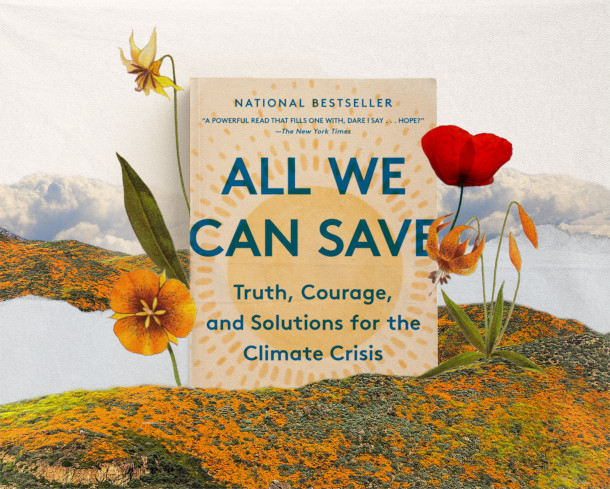
Published in 2020, All We Can Save is an anthology of essays, poetry, and art by women climate leaders, co-edited by Dr. Katharine Wilkinson and Dr. Ayana Elizabeth Johnson. The book has since inspired over 2,500 community circles across 30 countries. (Photo: Courtesy of Dr. Katharine Wilkinson)
DOERING: And they're not just book clubs, right?
WILKINSON: Right! They're not just book clubs. It's really about, how do we have a communal experience of deeper and more generous conversation about this topic than frankly, we find most of the time.
DOERING: There’s a project that grew out of All We Can Save called Climate Wayfinding. What's that about? I imagine it must be related to a lot of us feeling somewhat lost amid the climate chaos.
WILKINSON: I mean, we're living in a world where maps, quite literally, increasingly no longer work, right? And that's true as coastlines shift, as entire neighborhoods go up in flames, as storms wipe out farmland. You know, we're literally grappling with these very rapid shifts of the physical terrain. But I think this idea that our maps don't work is also true culturally and emotionally and internally, right? Our traditional ways of navigating human life are also coming up against some real challenges of this very liminal time. It is no small thing to be human on Earth, as there is so much that is being lost, there is so much that is being harmed, and there is still so much that is possible. And so how do we help one another, right, in this time where we're holding lots of big questions and we're facing lots of crossroads of different kinds, and how do we keep moving towards contribution and gain some clarity, some courage and a sense of connection to community along the way? So that's really what gave rise to Climate Wayfinding, a sense that we don't have enough spaces where we're able to bring those big questions and work with them in a generative way, right, where we look inward and look outward, so that we can then look forward. So Climate Wayfinding is a beautiful program. We did the first pilots of it almost three years ago, in the summer of 2022. And over the last year and a half, we've been beginning to scale that program across higher education. We now have 95 trained facilitators at about 80 colleges and universities across the US and Canada who are taking this program into the classroom, into J-terms, spring breaks, co curricular programs and really helping students find their way in this very tricky time. And think about what it does mean to shape their lives and their, you know, civic and professional trajectories within this context of our climate and ecological crisis.
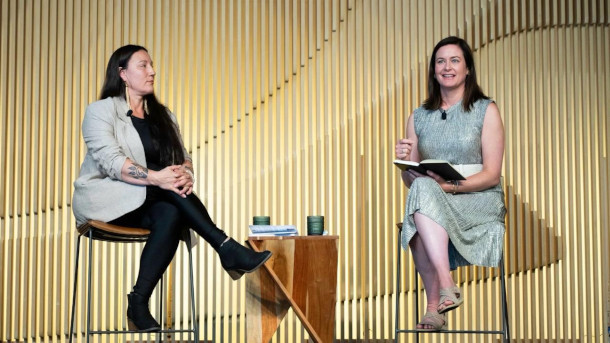
Dr. Katharine Wilkinson (right) and Indigenous rights activist Sherri Mitchell (left) in conversation. These moments of relational exchange are vital, Wilkinson says, to sustaining meaningful and transformative climate work. (Photo: Courtesy of Dr. Katharine Wilkinson)
DOERING: I’m curious, can you tell me about a time in your life when you kind of felt like you had lost your way, especially, you know, feeling lost in terms of climate. How did you find your way again?
WILKINSON: So, I think probably doing a PhD is a good recipe for losing your way.
DOERING: Oh, boy!
WILKINSON: Certainly, maybe at least for me, losing a little bit of a sense of my kind of vigor and spirit, but also, when I was finishing my PhD, it was in a particularly weird and hard moment in the climate space. So President Obama had been elected, it looked like we had the best chance in a generation for federal climate policy. It got through the house. It didn't get through the Senate. The international negotiations in Copenhagen kind of crumbled, fell apart, and I decided academia at that juncture was not the path for me. And I was really grappling with, where do I go, right? Where is there a foothold for generative action when clearly, so much was stalling at all of these different levels. And the zeitgeist at that time, this was 2009, 2010, the zeitgeist was kind of like, okay, if we can't make headway in these spaces, we've got to focus on cities and states and companies. And I had absolutely no experience in the world of business, but I ended up spending some years in consulting, and ultimately, for me, that was a really gutting chapter. I just basically felt like my little species was not in the right ecosystem. It was a lot about what and how, and not a lot about why, oftentimes. And I just felt so sad, frankly, and the way that I ultimately, sort of found my way out of that malaise, and really having kind of stepped back a bit from climate for a year or two, I went on a retreat with a group of quote, unquote, young leaders and activists that was facilitated by Parker Palmer, and that was a space for, I think, actually bringing all of the hard stuff that we were all grappling with, each in our own ways. And we did a Quaker process called a Clearness Committee, which leave it to Quakers to have had this very good way of helping people hold their big questions and their moments of not knowing in a way that's really supportive and generative. And I ended up kind of emerging from that retreat feeling like I had really tapped back into what I knew to be true and not what the world was telling me I should do or should try. And that ended up opening up kind of a whole new chapter. I ended up joining the team at Project Drawdown to do the bulk of writing that book Drawdown, and it brought me into, really, in a lot of ways, bringing together those threads I'd cared about for a long time. What is the story that we're telling? How do we invite more people into it? Using my own skills as kind of a words person, and I think that those moments, those kind of dark nights of the soul, even, if you will, we need each other, right? Those are really hard spaces to navigate solo and having kind of a sanctuary, and this sense of structured and supportive process was really important. And I think there are a lot of ways in which that experience, which was back in 2015 really has informed some of what we're doing with Climate Wayfinding. Because what I knew in my climate journey was that I was often going outside of the climate space to get that kind of help and support and grounding and renewal. And really we should be doing that from within the movement, from within the climate community itself.
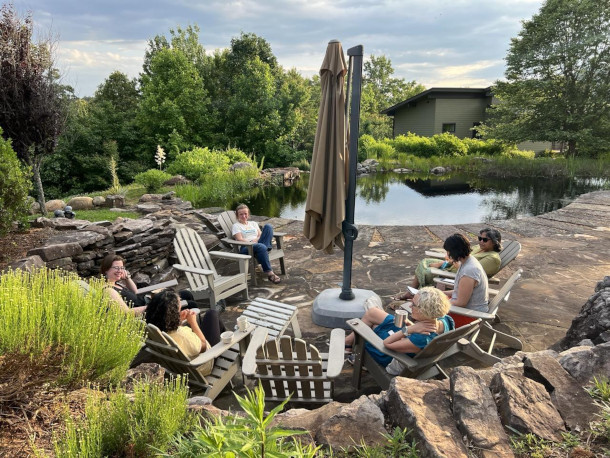
A group gathers outdoors for a Climate Wayfinding circle, reflecting a core value of the program: grounding oneself in the natural world to grapple with ecological loss and possibility. (Photo: Courtesy of Dr. Katharine Wilkinson)
DOERING: Kind of thinking back to the Clearness Committee, and then moving forward through the All We Can Save Circles and Climate Wayfinding. It seems like there's kind of a resonance there, like these spaces where people can come together and talk about these difficult issues and work through them in community.
WILKINSON: Yeah, I think from a kind of nitty gritty perspective, in a lot of ways, this is relational organizing, but it's also shoring us up to keep doing work that is frankly hard, even when we're making big strides, even when we have big wins. This problem is so massive, right? And we're chipping away at this over years and decades, you've got to have some real stamina for that. And to me, often, the thing that makes the work really good in the here and now is who we get to do it with, and finding a sense of community and camaraderie and joy in those relationships that form around the work that we're doing. And so more often than not, I think we see that when we don't do that work of kind of the inner work, the relational work, people burn out, right? They get fried. We step on each other when we don't intend to. We show up in ways that are antithetical to the future that we imagine because we're so stuck in the machinery of the here and now. I don't think it's just like, oh, this sort of feels good. It's nice to have. I think it is profoundly strategic if we want to get the policy wins that we dream of, move the technologies forward, get those market shifting movements of capital, shore up the resilience of our cities, like all of that hinges on people. People are making all of the rest of this possible or not. And I think sometimes we're not centering humans enough in what we're doing. And I'm not saying that in the sense of, like, human life matters, other life doesn't. No, I'm saying like, sort of the heart and soul and well-being of the people that are doing this really hard work, I think is important. I think we have to be a community and a movement that takes care of each other.
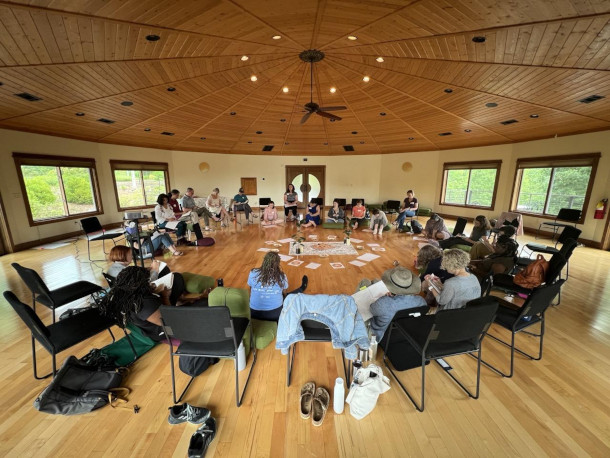
The Climate Wayfinding program offers in-person and online workshops, and has trained facilitators to host their own workshops, often on college campuses. (Photo: Courtesy of Cade Castle)
DOERING: There is so much these days that is overwhelming, even just tuning into the news, you know, how do you think that taking the approach of recentering on our values can help us in this moment in particular?
WILKINSON: Let's take a tree as a metaphor, right? This is like, not really the season for a lot of above ground action, at least at the federal level, but in a lot of ways, I think in a moment like this, it's time to do some of that mycelial work, right? Sort of the underground part of the work, so that when we have another more generative opening, we're ready for it, and we, our kind of root systems are stronger and more deeply intertwined, so that we can grow even stronger at that next opening time, if that makes sense. And I don't think that's a cop out, right? I think it's actually reading the context that we're in and understanding that there is often a cycle to these things, and this is a time to really grow the strength of the community, of the leadership, and, of course, to try to sort of push back and forestall those losses as much as we can.
DOERING: Do you have a message for people who feel like it's just all too much, I just want to tune out?
WILKINSON: I mean, I think the first thing I would say is I get it. One of the ways I keep my own root system strong and remember that it is actually a very cool thing to be alive in a body on this planet is that I have a horse that I am training, and it's just like my greatest source of joy, and in so many ways, has nothing to do with my work on climate, and in other ways, has everything to do with my work on climate. And I think part of the task of being alive is being awake, and that doesn't mean being awake to everything. I think there's a role for thinking about the resource of our attention and deploying it really thoughtfully. So not just like floating into, you know, the morass of every headline, every social media post. But like, where am I really going to bring this gift of my attention so that I can be effective in the spaces where I'm going to be effective? You know, the reality is that, well before our current political situation, like, we could only each do so much, and so, like, I think about this idea that that we're each kind of a node of possibility in this much bigger ecosystem. And to me, part of being a node of possibility is knowing like, what's yours to do and what is not yours to do, and trusting that there are all of these other nodes in the ecosystem that are also bringing their magic, right, and doing their thing. And so I think resisting some of that, like I don't want to look at any of it, I don't want to do any of it, and sort of saying, okay, what's the piece that I can can do with attention, with intention, and know that I am in some way contributing to this broader effort to bring healing to this planet.
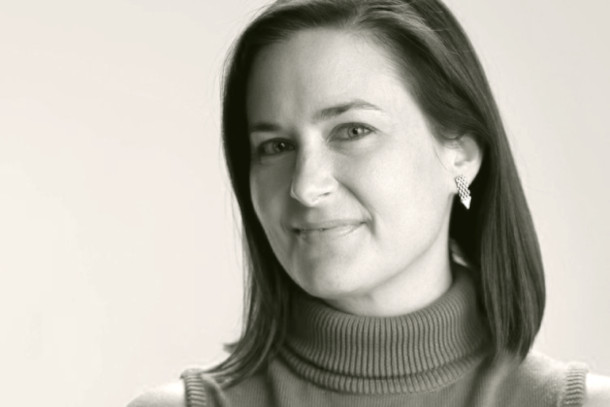
Dr. Katharine K. Wilkinson, co-founder of the All We Can Save Project and creator of Climate Wayfinding, has spent years amplifying underrepresented voices in the climate movement. In her work, she emphasizes the need for emotional resilience, community, and clarity in the face of ecological crisis. (Photo: Courtesy of Dr. Katharine Wilkinson)
DOERING: You know, thinking of each person as a node, as you were saying, maybe there's sort of a exponential positive impact that flows out into the world from the kind of work that you're doing.
WILKINSON: One of my greatest wishes, Jenni, is that that is so. Like we know this in our own lives, right? The things that are the most transformative for us personally are often things that are pretty intimate, right, that are pretty small scale. Whether that's a relationship or an experience, it's not a social post that gets 900,000 likes or whatever, right? Those are just not the things that create deep change. I think deep change is what is really called for in this moment. And I'm very into nature metaphors, apparently today, but as you were talking, I was imagining what it looks like when rain starts to fall on a lake or a pond, right? And you start to see the ripples running into other ripples and other ripples, and other ripples. I think that is what we're capable of doing together, of creating that kind of, sort of rippling, flowing change that is different than the kind of like linear, exponential, right, sorts of trajectories that somehow we've been taught are where power lies, and I'm just not sure that that's true.
DOERING: Katharine Wilkinson is co-founder and Executive Director of the All We Can Save Project and creator of Climate Wayfinding, and she's also co-host of the podcast A Matter of Degrees. Thank you so much, Katharine.
WILKINSON: Jenni, this was such a lovely, rich conversation. Thank you.
Links
Living on Earth wants to hear from you!
Living on Earth
62 Calef Highway, Suite 212
Lee, NH 03861
Telephone: 617-287-4121
E-mail: comments@loe.org
Newsletter [Click here]
Donate to Living on Earth!
Living on Earth is an independent media program and relies entirely on contributions from listeners and institutions supporting public service. Please donate now to preserve an independent environmental voice.
NewsletterLiving on Earth offers a weekly delivery of the show's rundown to your mailbox. Sign up for our newsletter today!
 Sailors For The Sea: Be the change you want to sea.
Sailors For The Sea: Be the change you want to sea.
 The Grantham Foundation for the Protection of the Environment: Committed to protecting and improving the health of the global environment.
The Grantham Foundation for the Protection of the Environment: Committed to protecting and improving the health of the global environment.
 Contribute to Living on Earth and receive, as our gift to you, an archival print of one of Mark Seth Lender's extraordinary wildlife photographs. Follow the link to see Mark's current collection of photographs.
Contribute to Living on Earth and receive, as our gift to you, an archival print of one of Mark Seth Lender's extraordinary wildlife photographs. Follow the link to see Mark's current collection of photographs.
 Buy a signed copy of Mark Seth Lender's book Smeagull the Seagull & support Living on Earth
Buy a signed copy of Mark Seth Lender's book Smeagull the Seagull & support Living on Earth

